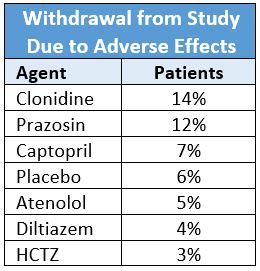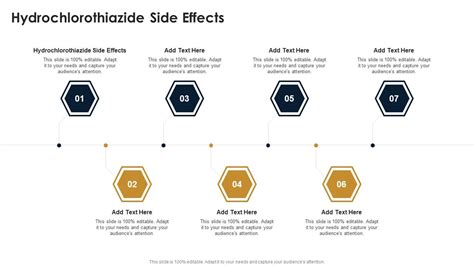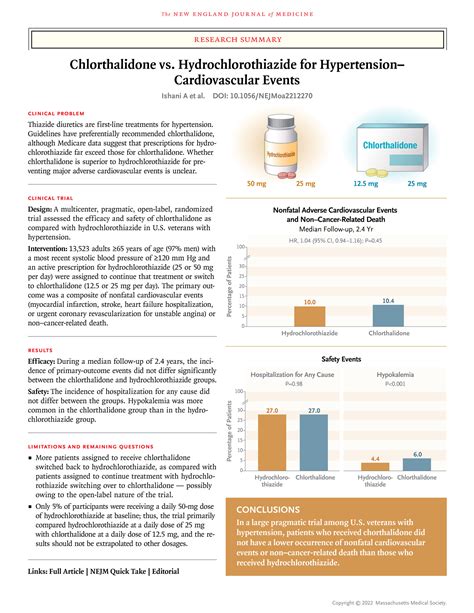Intro
Discover 5 common Hydrochlorothiazide side effects, including blood pressure changes, electrolyte imbalance, and kidney issues, affecting diuretic users, and learn to manage these symptoms and interactions for better health outcomes.
Hydrochlorothiazide, commonly referred to as HCTZ, is a diuretic medication used to treat high blood pressure and edema. It works by helping the kidneys remove more waste and excess fluids from the body, which in turn lowers blood pressure and reduces swelling. While hydrochlorothiazide is effective in managing these conditions, it can also cause a range of side effects. Understanding these potential side effects is crucial for patients to make informed decisions about their treatment and to recognize when they need to seek medical help.
The importance of being aware of the side effects of hydrochlorothiazide cannot be overstated. Patients who are well-informed about the possible risks associated with their medication are better equipped to manage their condition and improve their overall quality of life. Moreover, recognizing side effects early can help prevent more serious complications from developing. With this in mind, it's essential to delve into the specifics of hydrochlorothiazide side effects, exploring both the common and less common effects that patients may experience.
As with any medication, the impact of hydrochlorothiazide can vary significantly from one individual to another. Factors such as age, dosage, and the presence of other health conditions can all influence how a person reacts to the drug. By examining the most frequently reported side effects, patients and healthcare providers can work together to minimize risks and maximize the benefits of hydrochlorothiazide treatment. This collaborative approach is key to achieving effective blood pressure management and reducing the risk of complications associated with hypertension and fluid retention.
Introduction to Hydrochlorothiazide Side Effects

Common Hydrochlorothiazide Side Effects

Less Common but Significant Side Effects
While less frequent, some side effects of hydrochlorothiazide can have a significant impact on a patient's health and quality of life. These include: - Electrolyte imbalance: Hydrochlorothiazide can lead to changes in levels of potassium, sodium, and other electrolytes, which are crucial for various bodily functions. - Gout: The drug can increase uric acid levels, potentially triggering gout attacks in susceptible individuals. - Impaired glucose tolerance: Hydrochlorothiazide may affect blood sugar levels, making it more challenging for diabetic patients to manage their condition. - Allergic reactions: Although rare, some patients may experience allergic reactions to hydrochlorothiazide, which can range from mild skin rashes to severe anaphylaxis.Managing and Preventing Hydrochlorothiazide Side Effects

Special Considerations
Certain individuals may require special consideration when taking hydrochlorothiazide, including: - Pregnant or breastfeeding women: The use of hydrochlorothiazide during pregnancy or breastfeeding should be discussed with a healthcare provider, as it may pose risks to the fetus or baby. - Elderly patients: Older adults may be more susceptible to dehydration and electrolyte imbalances due to age-related changes in the body. - Patients with kidney or liver disease: Hydrochlorothiazide can affect kidney function and may not be suitable for patients with severe kidney or liver disease.Conclusion and Future Directions

Final Thoughts on Hydrochlorothiazide
The journey to managing hypertension and edema effectively with hydrochlorothiazide involves a deep understanding of its side effects and a commitment to proactive healthcare management. By staying informed, maintaining open communication with healthcare providers, and adhering to treatment plans, patients can navigate the complexities of hydrochlorothiazide therapy with confidence. As medical science evolves, so too will our understanding of hydrochlorothiazide and its role in modern medicine, offering new avenues for treatment and improved patient care.What are the most common side effects of hydrochlorothiazide?
+The most common side effects include increased urination, dehydration, dizziness, lightheadedness, and headache. These effects are usually mild and temporary but should be discussed with a healthcare provider if they persist or worsen.
Can hydrochlorothiazide cause serious side effects?
+Yes, while rare, hydrochlorothiazide can cause serious side effects such as severe allergic reactions, significant electrolyte imbalances, and impaired glucose tolerance. Patients should seek immediate medical attention if they experience any severe symptoms.
How can I minimize the risk of side effects from hydrochlorothiazide?
+To minimize the risk of side effects, stay hydrated by drinking plenty of water, monitor your electrolyte levels regularly, adjust your diet as recommended by your healthcare provider, and promptly report any unusual or persistent side effects.
We invite you to share your thoughts and experiences with hydrochlorothiazide in the comments below. Your insights can help others better understand the medication and its effects. If you found this article informative, please consider sharing it with others who might benefit from this information. Together, we can foster a community that supports informed healthcare decisions and improves patient outcomes.
